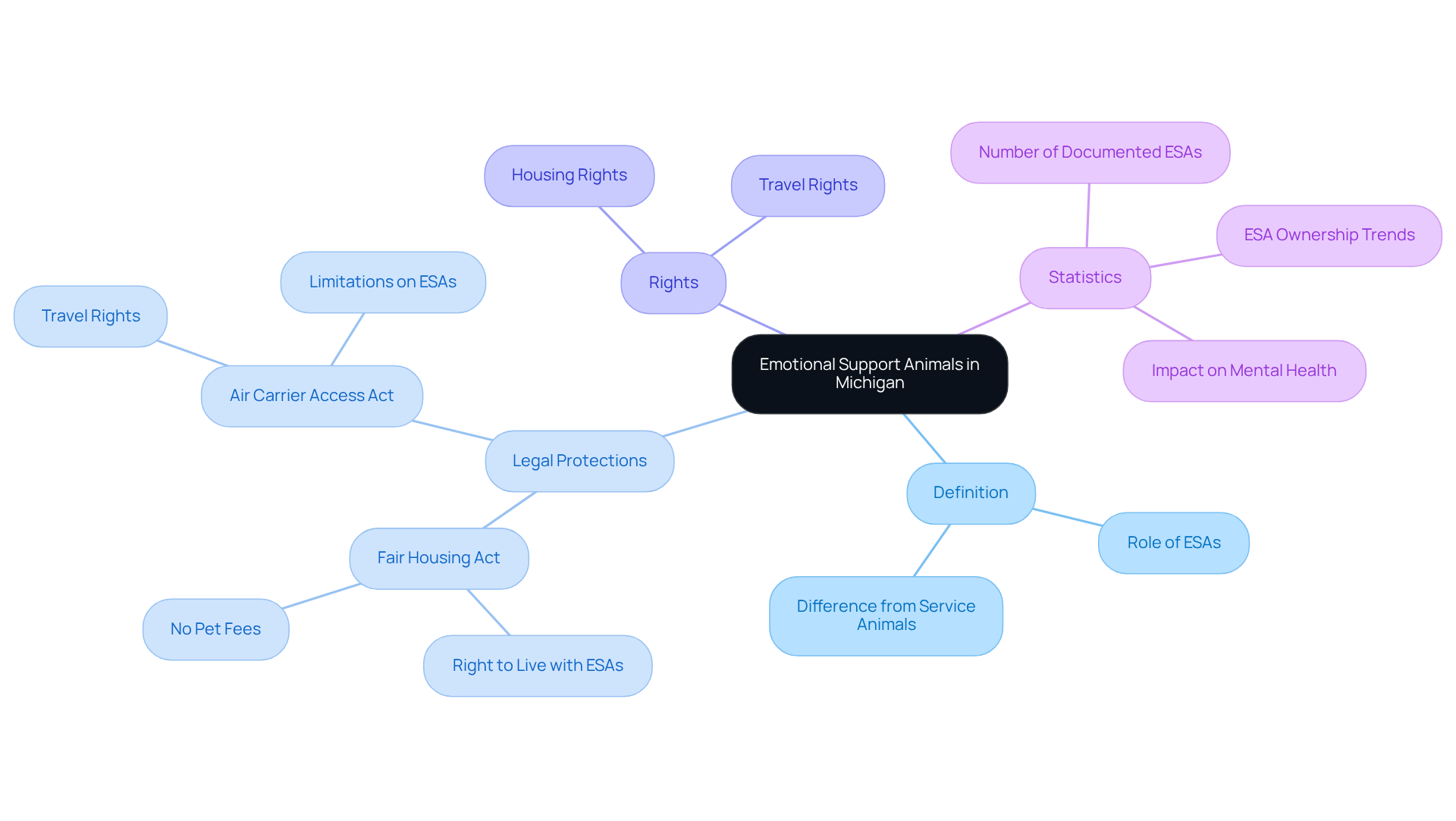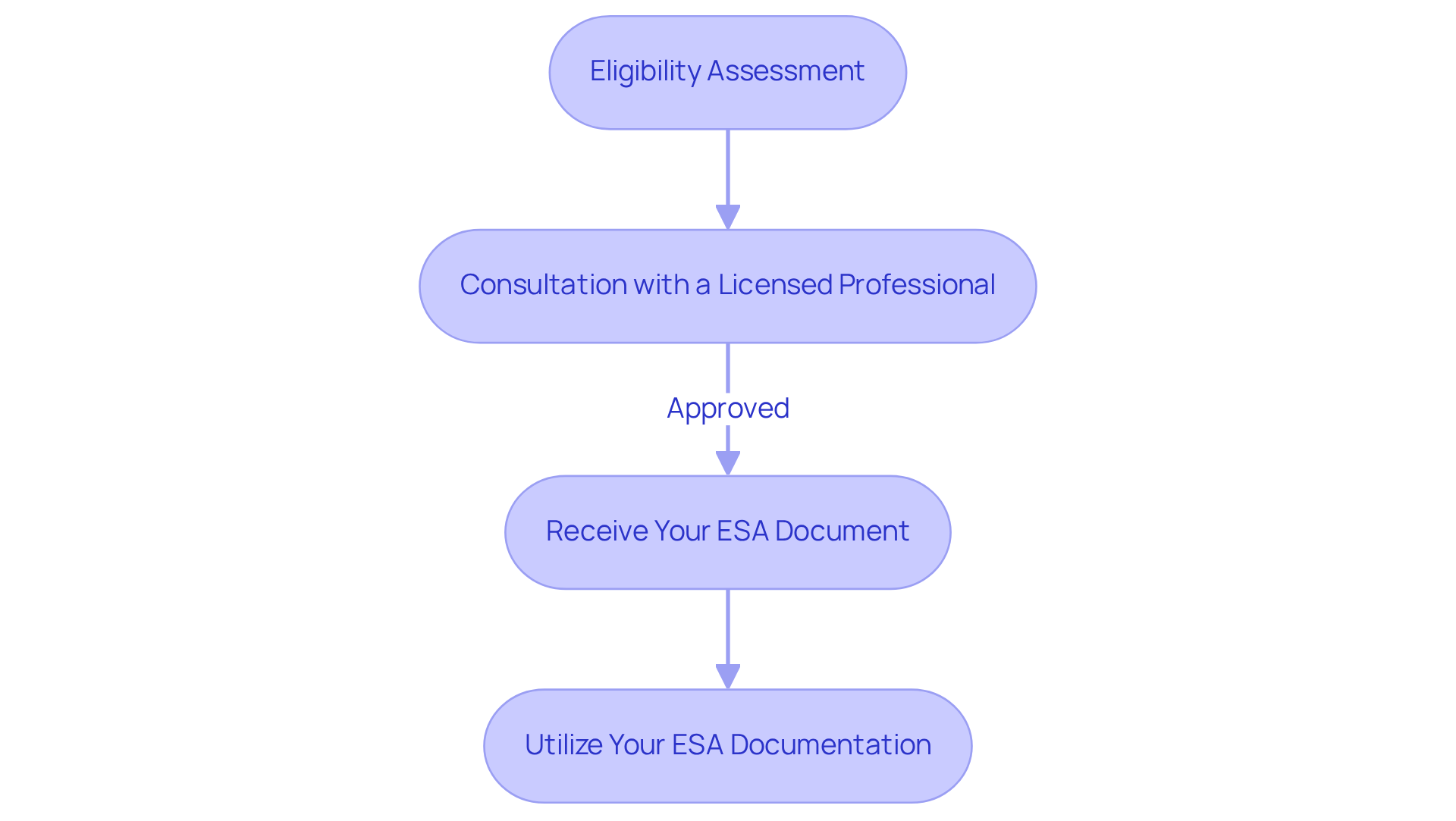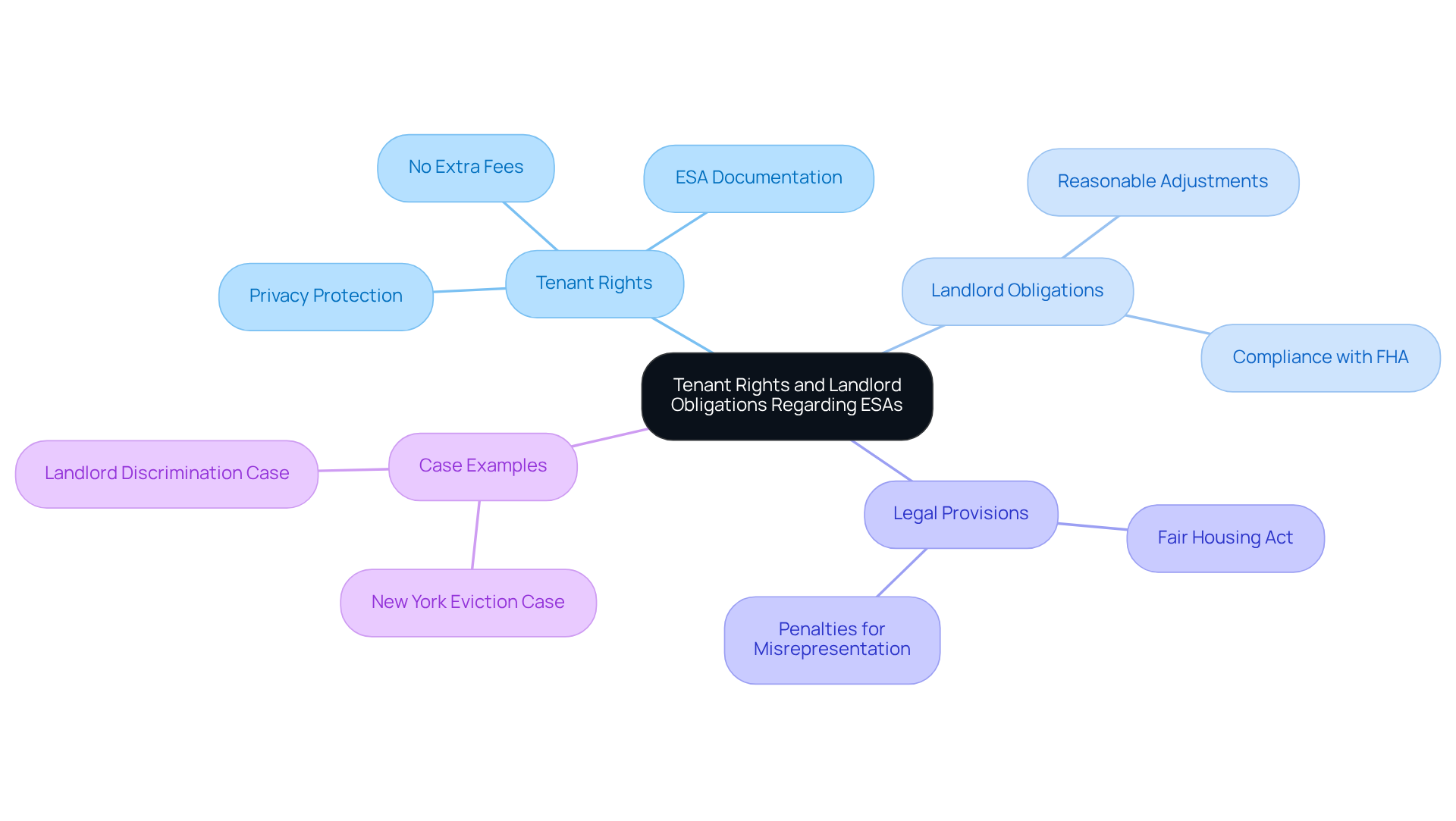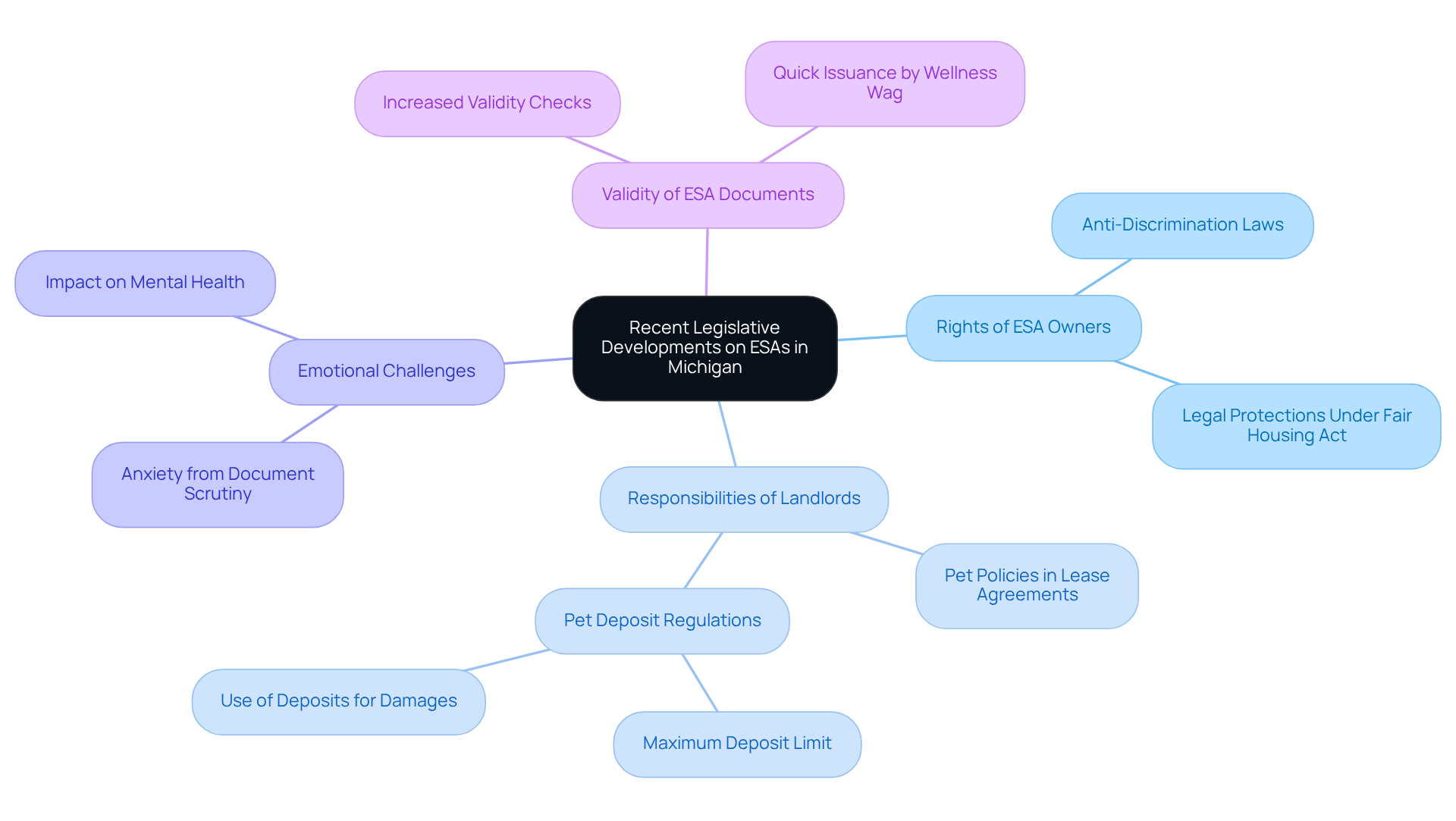

Emotional Support Animal Laws Michigan: Your Complete Guide
by Lena Park
Last updated: July 6, 2025
Verified and Approved by:
Angela Morris,
MSW, LCSW
Fact Checked

Overview
Emotional support animals (ESAs) in Michigan play a vital role for individuals facing emotional challenges. These animals are recognized under laws that allow their owners to live in pet-restricted housing and travel with them on airlines, provided they have valid ESA documentation from a licensed mental health professional. This legislation is a beacon of hope for many, ensuring that those who need emotional support can maintain their bond with their beloved companions.
For individuals grappling with mental health issues, the presence of an ESA can be incredibly comforting. The legal protections afforded to ESA owners emphasize that landlords cannot impose pet fees or deny reasonable accommodation requests. This means that individuals can seek the emotional support they need without facing undue financial burdens, allowing them to focus on their well-being.
If you find yourself struggling with emotional challenges, know that you are not alone. The support available through ESAs can make a significant difference in your life, providing companionship and comfort during difficult times. Remember, having an ESA is not just about the animal; it’s about the emotional connection that helps you navigate life’s challenges with a little more ease.
Introduction
Emotional Support Animals (ESAs) have become vital companions for those navigating the emotional and psychological hurdles of life, offering comfort and stability during challenging times. In Michigan, the legal framework surrounding ESAs provides important protections, enabling individuals to live and travel with their beloved animals under certain conditions.
Yet, understanding the complexities of ESA laws can feel overwhelming, especially in light of recent legislative changes that affect tenant rights and landlord responsibilities. How can you ensure that you fully grasp your rights while also adhering to the evolving regulations?
This guide explores the essential aspects of emotional support animal laws in Michigan, empowering you to advocate for your needs with confidence and clarity.
Define Emotional Support Animals and Their Legal Status in Michigan
Emotional Support Animals serve as vital companions for individuals navigating emotional or psychological difficulties, offering comfort and assistance without the need for specialized training. In Michigan, emotional support animal laws Michigan recognize these animals under the Fair Housing Act (FHA) and the Air Carrier Access Act (ACAA). These emotional support animal laws in Michigan empower individuals with valid emotional support animal letters to:
- Live with their animals in housing that typically prohibits pets
- Travel with them on airlines
While these protections are crucial, it’s important to understand that emotional support animals do not enjoy the same access privileges as service animals in public spaces. For example, emotional support animal laws in Michigan state that landlords cannot impose pet fees or deny reasonable accommodation requests for emotional support animals, provided the need is documented by a licensed mental health professional. This legal framework is designed to support individuals with disabilities in securing housing without incurring additional costs as stipulated by the emotional support animal laws Michigan.
Moreover, the increasing acknowledgment of ESAs is evident in the rising number of documented ESAs in the U.S., which has now reached approximately 200,000. Understanding these legal protections is essential for pet owners, helping them navigate housing and travel challenges with confidence and reassurance.

Outline the Process for Obtaining an ESA Letter in Michigan
Acquiring an ESA document in Michigan can be a significant step towards enhancing your mental well-being under emotional support animal laws Michigan. Let’s walk through the essential steps together, ensuring you feel supported throughout this process.
- Eligibility Assessment: Start with a brief assessment to determine your qualification for an ESA based on your mental health needs. This initial step is crucial, as it lays the groundwork for what comes next. It’s important to recognize that understanding your eligibility can bring a sense of relief and clarity.
- Consultation with a Licensed Professional: Schedule a consultation with a licensed mental health professional who will thoughtfully evaluate your situation. They will help determine if an ESA is the right fit for you. This consultation is vital; professionals emphasize the importance of a genuine provider-patient relationship to ensure effective support and therapy.
- Receive Your ESA Document: If approved, you will receive your official ESA document, typically within 24 hours. This document should be on the professional’s stationery and include their license details, ensuring its authenticity. Having this document can feel empowering, as it validates your needs and rights.
- Utilize Your ESA Documentation: Present your ESA documentation to property owners or airlines to secure your rights under the Fair Housing Act (FHA) and the Air Carrier Access Act (ACAA). Understanding these rights is essential; remember that landlords can only deny ESA requests if the animal poses a direct threat or could cause significant damage.
By following these steps, you can navigate the process of acquiring an ESA document in Michigan while adhering to emotional support animal laws Michigan with confidence. Remember, you are not alone in this journey, and there is support available to help you every step of the way.

Explain Tenant Rights and Landlord Obligations Regarding ESAs
In Michigan, individuals facing emotional challenges can find solace in the rights afforded to them under the Fair Housing Act (FHA) according to emotional support animal laws Michigan when they hold valid Emotional Support Animal (ESA) letters. This important legislation, under emotional support animal laws Michigan, requires property owners to make reasonable adjustments for renters with emotional support animals, allowing these cherished companions in residences that typically restrict pets. It’s essential to note that, under emotional support animal laws Michigan, property owners cannot impose additional pet fees or deposits for ESAs, which helps ensure that tenants can maintain their emotional support without the burden of extra costs.
Tenants should be prepared to present their ESA document, issued by a licensed mental health professional. They may also need to engage in conversations with their property owner to clarify their rights and ensure adherence to the law. Have you ever felt uncertain about your rights? Understanding this process can be a crucial step in fostering a supportive living environment.
For instance, a notable case in New York awarded $750,000 to a tenant wrongfully evicted due to her emotional support parrots. This highlights the serious consequences property owners may face when they fail to comply with ESA regulations. Moreover, under emotional support animal laws in Michigan, property owners can only request the ESA letter to verify a tenant’s need for an emotional support animal, and they cannot directly contact the mental health professional without the tenant’s consent. This provision not only safeguards tenant privacy but also ensures that property owners fulfill their responsibilities under the FHA.
Overall, understanding these rights and obligations is vital for both tenants and property owners, nurturing a respectful and compliant living environment. As awareness of the mental wellness benefits of emotional support animals grows, it’s heartening to note that about 18% of pet owners in the U.S. now report having one. This statistic underscores the increasing importance of these regulations and the support they provide to those in need.

Review Recent Legislative Developments Impacting ESA Regulations in Michigan
Recent legislative developments in Michigan have brought much-needed clarity to the rights of Emotional Support Animal (ESA) owners and the responsibilities of landlords under emotional support animal laws Michigan. With new bills introduced in 2025, emotional support animal laws Michigan are being enhanced to provide better protections for tenants with ESAs, explicitly prohibiting discrimination in housing situations. These updates are crucial, as they reinforce the legal standing of ESA owners in accordance with emotional support animal laws Michigan, ensuring they can live with their beloved animals without facing unjust barriers. Furthermore, the Michigan Fair Housing Amendments Act and emotional support animal laws in Michigan prevent discrimination against tenants with disabilities, further solidifying these important protections.
However, it’s important to recognize the emotional challenges that many individuals with mental health issues face. The increase in scrutiny regarding the validity of ESA documents can heighten anxiety for those seeking support. Statistics show that more ESA documents are undergoing validity checks, reflecting a commitment to maintaining the integrity of the process. Companies like Wellness Wag offer ESA letters within 24 hours of approval, ensuring timely support for those in need.
These legislative changes not only empower ESA owners but also introduce new responsibilities for property owners in accordance with emotional support animal laws Michigan. In Michigan, property owners may charge a pet deposit, which must not exceed one and a half months’ rent, and they are required to incorporate specific pet policies in lease agreements to prevent conflicts. As the landscape surrounding emotional support animals continues to evolve, it is essential for both ESA owners and landlords to stay informed about these developments. By doing so, they can ensure compliance and protect their rights, fostering a supportive environment for all.

Conclusion
Emotional Support Animals (ESAs) are vital companions for individuals navigating emotional or psychological challenges. In Michigan, the legal framework surrounding ESAs offers essential protections, allowing individuals to live and travel alongside their beloved animals without facing unnecessary obstacles. By understanding the nuances of ESA laws in Michigan, individuals can confidently navigate housing and travel situations, ensuring their rights are respected.
The process of obtaining an ESA letter is crucial, involving eligibility assessments and consultations with licensed professionals. These steps are not just formalities; they are lifelines that empower individuals to secure the necessary documentation to support their needs. Recent legislative developments have further strengthened these protections, highlighting the importance for both ESA owners and landlords to remain informed about their rights and responsibilities.
As awareness of the benefits of emotional support animals expands, so does the need to understand the legal landscape that governs them. Advocating for one’s rights and staying informed about current regulations fosters a supportive environment that acknowledges the invaluable role of emotional support animals. It is essential to actively engage with these laws, ensuring that everyone can navigate their challenges with the compassionate support they deserve.
Frequently Asked Questions
What are Emotional Support Animals (ESAs)?
Emotional Support Animals are companions that provide comfort and assistance to individuals facing emotional or psychological difficulties, without requiring specialized training.
What legal protections do ESAs have in Michigan?
In Michigan, ESAs are recognized under the Fair Housing Act (FHA) and the Air Carrier Access Act (ACAA), allowing individuals with valid ESA letters to live with their animals in pet-restricted housing and travel with them on airlines.
Do ESAs have the same access rights as service animals?
No, ESAs do not have the same access privileges as service animals in public spaces. Their protections primarily apply to housing and air travel.
Can landlords impose pet fees for Emotional Support Animals in Michigan?
No, landlords cannot impose pet fees or deny reasonable accommodation requests for ESAs, as long as the need for the animal is documented by a licensed mental health professional.
How many documented Emotional Support Animals are there in the U.S.?
The number of documented Emotional Support Animals in the U.S. has reached approximately 200,000.
Why is it important to understand the legal status of ESAs?
Understanding the legal protections for ESAs helps pet owners navigate housing and travel challenges, ensuring they can secure accommodations without incurring additional costs.
Certify Your Emotional Support Animal Today

Why You Can Rely on Us?
At Wellness Wag, we believe your pet deserves care rooted in both science and compassion. Each article is carefully researched, written in clear language for pet owners, and then reviewed by qualified professionals to ensure the information is evidence-based, current, and practical for real-life care. Our goal is to help you feel confident in making informed decisions about your pet’s health and well-being.
Reviewed by
Angela Morris, MSW, LCSW
Angela is a licensed clinical social worker with 20 years of experience in patient advocacy and community mental health. She has assisted numerous clients with ESA evaluations and brings a deep understanding of disability accommodations, ensuring that all information is accurate, supportive, and practical.

Written by :
Lena Park
Last Updated :
July 6, 2025












